This article was medically reviewed by Ricardo Correa, MD. Dr. Correa is a board certified Endocrinologist. Dr. Correa is the Program Director of the Endocrinology, Diabetes and Metabolism Fellowship at the University of Arizona College of Medicine and was a previous Assistant Professor of Medicine at Brown University. He completed his MD at the University of Panama and completed an internal medicine residency at the Jackson Memorial Hospital - University of Miami. He has been voted one of the 40 Under 40 Leaders in Health by the National Minority Quality Forum in 2019.
There are 11 references cited in this article, which can be found at the bottom of the page.
This article has been viewed 72,159 times.
The thyroid gland is located at the base of your neck. It is a very important gland that produces a hormone that helps regulate your entire body’s metabolism, temperature, heart rate, growth, and development. The thyroid gland can be functionally underactive or overactive. The thyroid can be enlarged, have benign nodules (growths) and, more rarely, malignant nodules.
Steps
Knowing When to Check Your Thyroid
-
1Monitor for symptoms of hypothyroidism. Hypothyroidism is the condition where you have an underactive thyroid. All forms of hypothyroidism can be caused by viral infections, radiation damage, some medications, pregnancy, and other rarer causes. Symptoms of an underactive thyroid include:[1] [2]
- Severe and constant fatigue
- Changes in the menstrual cycle
- Constipation
- Depression
- Dry, coarse hair
- Hair loss
- Dry skin
- Disturbed sleep cycle, such as wanting to sleep all the time
- Intolerance to cold
- Decreased heart rate
- Muscle weakness
- Unexplained weight gain or difficulty losing weight
-
2Watch for symptoms of hyperthyroidism. Hyperthyroidism is the condition where you have an overactive thyroid. This condition can be a result of Grave’s disease, tumors, thyroiditis (inflammation), thyroid nodules, and some medications.[3] Symptoms of an overactive thyroid include:[4]
- Rapid heart rate or palpitations
- Increased respiratory rate
- Frequent and loose bowel movements or diarrhea
- Fine hair that may be falling out
- Unexplained weight loss
- Nervousness, irritability, a feeling of high energy
- Anxiety or panic attacks
- Psychosis
- Moodiness
- Intolerance to heat
- Sweatiness
- Reddish skin which may be itchy
Advertisement -
3Understand the symptoms may be due to another condition. Remember that many of these symptoms are not specific to thyroid disease. Determine if you have multiple symptoms, or just a few. If you are unsure, go to your physician for tests.[5] [6]
- For example, gaining weight may be due to eating more or exercising less, and not due to thyroid disease. Feeling nervous or anxious may be due to a new job or an underlying mental health issue. Skin dryness can be due to low humidity or not enough healthy fats in the diet. Constipation can be due to not enough fiber in your diet or a number of digestive conditions while diarrhea can be due to digestive conditions or food sensitivities.
Checking Your Thyroid
-
1Examine your neck. Use a mirror to check the base of your neck. Focus the mirror on the lower part of your neck, between your voice box and collarbone. Tilt your head back and take a sip of water.[7] If there is any swelling, tenderness, or bumps/lumps or nodules at the base of the neck, call your physician and let her know you are concerned about the finding and if you should be checked for thyroid disease.
- Make sure the lighting is good enough so that you can see clearly.
-
2Check for long-lasting symptoms. Look for symptoms that last longer than two to three weeks. If your symptoms revolve around your monthly cycle, look for symptoms that continue longer than two to three cycles. For example, you may be constantly tired with no good explanation for it because you seem to sleep long enough and get enough rest.
- Being tired alone is not enough to indicate a thyroid problem, as tiredness and fatigue can be caused by many things.
-
3Keep track of your symptoms. Use a large calendar on the fridge or a large notebook to record how many hours you slept and if you felt rested, when you get your periods, if you feel too cold or too warm, if you have gained weight or lost weight, or if you feel like your heart or breath is racing. Record what you were doing when you had that sensation. If you feel nervous or anxious, take a few minutes to assess if it seems to be because of events in your life or if it seems to be unexplainable.[8]
- Thyroid disorders can be silent for a long time. The body has a number of mechanisms to compensate for thyroid dysfunction; however, don’t hesitate to ask your physician to run tests if you are concerned about your thyroid function.
-
4Have your blood checked by your doctor. The best way to check your thyroid is to get your doctor to test your blood. Your doctor can check for the levels of Thyroid Stimulating Hormone (TSH). You should also consider asking that your levels of T3 and free T4 be checked as well, because differences in these levels can give you more information about the condition of the thyroid.[9]
- Since the thyroid is controlled via TSH from the pituitary, sometimes what looks like thyroid disease may actually be due to pituitary problems, though this is rare.
- Low TSH may indicate an overactive thyroid, while high TSH may indicate an underactive thyroid. High levels of free T4 or T3 may point to a hyperactive thyroid, while low levels may point to a hypoactive thyroid. Your doctor will be able to interpret your results and let you know where your TSH levels fall.
-
5Be prepared for additional tests. Since pituitary conditions may be the underlying cause of thyroid problems, your doctor may order additional tests to look for other conditions. Depending on your specific situation, other tests may be ordered to determine a final diagnosis.[10]
- These additional tests include: an iodine uptake scan, thyroid ultrasound, measurement of thyroid antibodies, or a thyroid needle biopsy if nodules are detected.[11]
Expert Q&A
-
QuestionWhat are early warning signs of hyperthyroidism?
 Damaris Vega, MDDr. Damaris Vega is a board certified Endocrinologist. She graduated Magna Cum Laude from the Pontifical Catholic University of Puerto Rico with a BS in General Science and subsequently earned an MD from the Ponce School of Medicine, Ponce, PR. During medical school, Dr. Vega served as president of the Alpha Omega Alpha Medical Honor Society and was selected as her school's representative for the American Association of Medical Colleges. She then completed a residency in Internal Medicine and a fellowship in Endocrinology, Diabetes, Mineral, and Metabolism at The University of Texas Southwestern Medical School. Dr. Vega has been recognized for excellent patient care multiple times by the National Committee for Quality Assurance and received the Patients' Choice Award in 2008, 2009, and 2015. She is a fellow of the American College of Clinical Endocrinologists and is an active member of the American Association of Clinical Endocrinologists, the American Diabetes Association, and the Endocrine Society. Dr. Vega is also the founder and CEO of Houston Endocrinology Center as well as a principal investigator for multiple clinical trials at Juno Research, LLC.
Damaris Vega, MDDr. Damaris Vega is a board certified Endocrinologist. She graduated Magna Cum Laude from the Pontifical Catholic University of Puerto Rico with a BS in General Science and subsequently earned an MD from the Ponce School of Medicine, Ponce, PR. During medical school, Dr. Vega served as president of the Alpha Omega Alpha Medical Honor Society and was selected as her school's representative for the American Association of Medical Colleges. She then completed a residency in Internal Medicine and a fellowship in Endocrinology, Diabetes, Mineral, and Metabolism at The University of Texas Southwestern Medical School. Dr. Vega has been recognized for excellent patient care multiple times by the National Committee for Quality Assurance and received the Patients' Choice Award in 2008, 2009, and 2015. She is a fellow of the American College of Clinical Endocrinologists and is an active member of the American Association of Clinical Endocrinologists, the American Diabetes Association, and the Endocrine Society. Dr. Vega is also the founder and CEO of Houston Endocrinology Center as well as a principal investigator for multiple clinical trials at Juno Research, LLC.
Board Certified Endocrinologist If you develop hyperthyroidism, you may start to experience anxiety, hot flashes, heart palpitations, and swollen eyes.
If you develop hyperthyroidism, you may start to experience anxiety, hot flashes, heart palpitations, and swollen eyes. -
QuestionCan I take vitamins to boost my thyroid health?
 Damaris Vega, MDDr. Damaris Vega is a board certified Endocrinologist. She graduated Magna Cum Laude from the Pontifical Catholic University of Puerto Rico with a BS in General Science and subsequently earned an MD from the Ponce School of Medicine, Ponce, PR. During medical school, Dr. Vega served as president of the Alpha Omega Alpha Medical Honor Society and was selected as her school's representative for the American Association of Medical Colleges. She then completed a residency in Internal Medicine and a fellowship in Endocrinology, Diabetes, Mineral, and Metabolism at The University of Texas Southwestern Medical School. Dr. Vega has been recognized for excellent patient care multiple times by the National Committee for Quality Assurance and received the Patients' Choice Award in 2008, 2009, and 2015. She is a fellow of the American College of Clinical Endocrinologists and is an active member of the American Association of Clinical Endocrinologists, the American Diabetes Association, and the Endocrine Society. Dr. Vega is also the founder and CEO of Houston Endocrinology Center as well as a principal investigator for multiple clinical trials at Juno Research, LLC.
Damaris Vega, MDDr. Damaris Vega is a board certified Endocrinologist. She graduated Magna Cum Laude from the Pontifical Catholic University of Puerto Rico with a BS in General Science and subsequently earned an MD from the Ponce School of Medicine, Ponce, PR. During medical school, Dr. Vega served as president of the Alpha Omega Alpha Medical Honor Society and was selected as her school's representative for the American Association of Medical Colleges. She then completed a residency in Internal Medicine and a fellowship in Endocrinology, Diabetes, Mineral, and Metabolism at The University of Texas Southwestern Medical School. Dr. Vega has been recognized for excellent patient care multiple times by the National Committee for Quality Assurance and received the Patients' Choice Award in 2008, 2009, and 2015. She is a fellow of the American College of Clinical Endocrinologists and is an active member of the American Association of Clinical Endocrinologists, the American Diabetes Association, and the Endocrine Society. Dr. Vega is also the founder and CEO of Houston Endocrinology Center as well as a principal investigator for multiple clinical trials at Juno Research, LLC.
Board Certified Endocrinologist Yes, however, you should ask your doctor first if you also take thyroid medication, as some vitamins can interfere with your medication.
Yes, however, you should ask your doctor first if you also take thyroid medication, as some vitamins can interfere with your medication. -
QuestionT3 is 2.94, T4 is 8.60, TSH is 2.37. Do I have thyroid disease?
 Chris M. Matsko, MDDr. Chris M. Matsko is a retired physician based in Pittsburgh, Pennsylvania. With over 25 years of medical research experience, Dr. Matsko was awarded the Pittsburgh Cornell University Leadership Award for Excellence. He holds a BS in Nutritional Science from Cornell University and an MD from the Temple University School of Medicine in 2007. Dr. Matsko earned a Research Writing Certification from the American Medical Writers Association (AMWA) in 2016 and a Medical Writing & Editing Certification from the University of Chicago in 2017.
Chris M. Matsko, MDDr. Chris M. Matsko is a retired physician based in Pittsburgh, Pennsylvania. With over 25 years of medical research experience, Dr. Matsko was awarded the Pittsburgh Cornell University Leadership Award for Excellence. He holds a BS in Nutritional Science from Cornell University and an MD from the Temple University School of Medicine in 2007. Dr. Matsko earned a Research Writing Certification from the American Medical Writers Association (AMWA) in 2016 and a Medical Writing & Editing Certification from the University of Chicago in 2017.
Family Medicine Physician Normal values for TSH range from 0.4 to 4.0 milli-international units per liter (mIU/L). You should check with your doctor to be sure. If your TSH is elevated, that is a marker for hypothyroid disease, and if your TSH is very low that is a marker for hyperthyroid disease.
Normal values for TSH range from 0.4 to 4.0 milli-international units per liter (mIU/L). You should check with your doctor to be sure. If your TSH is elevated, that is a marker for hypothyroid disease, and if your TSH is very low that is a marker for hyperthyroid disease.
References
- ↑ http://www.endocrineweb.com/conditions/thyroid/hypothyroidism-too-little-thyroid-hormone
- ↑ http://www.mayoclinic.org/diseases-conditions/hypothyroidism/symptoms-causes/dxc-20155382
- ↑ https://www.nlm.nih.gov/medlineplus/ency/article/003517.htm
- ↑ http://www.endocrineweb.com/conditions/hyperthyroidism/hyperthyroidism-overview-overactive-thyroid
- ↑ http://www.merckmanuals.com/home/hormonal-and-metabolic-disorders/pituitary-gland-disorders/hypopituitarism
- ↑ http://www.hormone.org/diseases-and-conditions/pituitary/overview
- ↑ http://www.thyroidawareness.com/neck-check
- ↑ https://www.synthroid.com/thyroid-doctor/symptoms
- ↑ https://my.clevelandclinic.org/health/diseases/8541-thyroid-disease






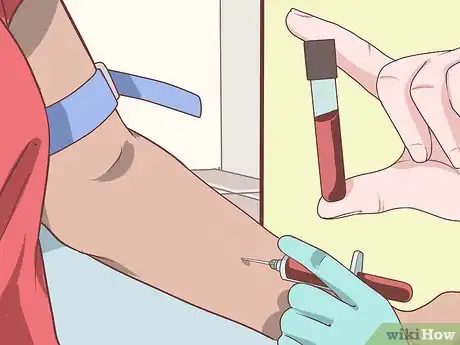
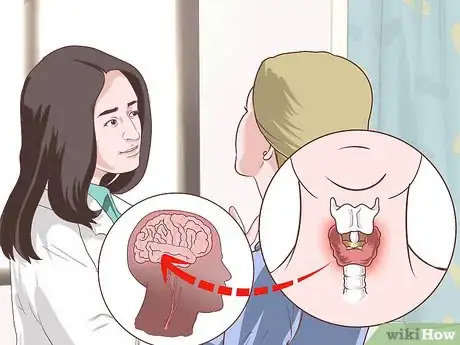
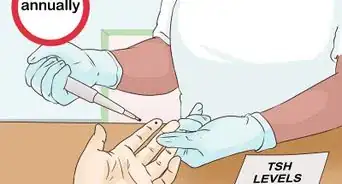








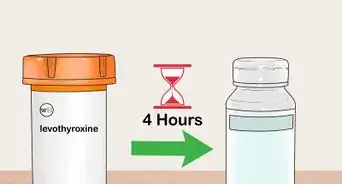


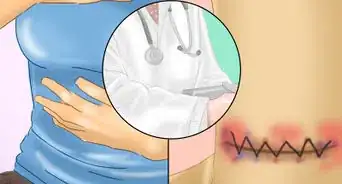










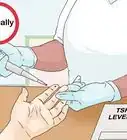






































Medical Disclaimer
The content of this article is not intended to be a substitute for professional medical advice, examination, diagnosis, or treatment. You should always contact your doctor or other qualified healthcare professional before starting, changing, or stopping any kind of health treatment.
Read More...